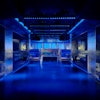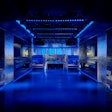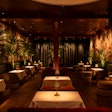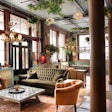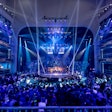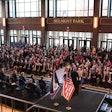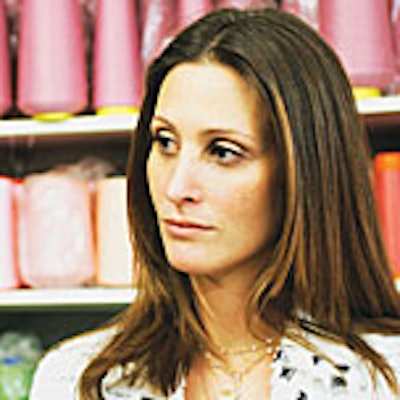
Stephanie Winston Wolkoff
Vogue
What She Plans: As director of special events, she runs 20 to 30 brand- and editorial-related events a year for editor in chief Anna Wintour, from dinners and movie premieres to fund-raisers and gala dinners—all drawing a swirl of fashion people, celebrities, social types, and politicians. Because of Vogue’s sponsorship of the Met’s Costume Institute gala—New York’s notorious “party of the year”—Wolkoff is the main contact for the numerous organizers from the museum, the magazine, and the sponsors, a tough task that got even tougher this year, as the team decided to scale back the after-party to restore the event’s oh-so-exclusive reputation. This year she also put on a launch dinner for Men’s Vogue in August, and produced the return of 7th on Sale, a November benefit for the CFDA-Vogue Initiative/New York City AIDS Fund. “The level of complexity of the events seems to grow and grow,” Wolkoff says.
Age: 34
Career Path: After attending Suffield Academy boarding school in Connecticut and Loyola University in New Orleans, Wolkoff went to work at Sotheby’s in 1993 as assistant to C.E.O. Dede Brooks, and later became manager of client services. Five years later, she went to Vogue as manager of public relations, and in 2000 Wintour tapped her to run special events.
Biggest Challenge: “Making the following year of the same event even greater and better than the year before. And making sure that my expectations are met each and every time—Anna is very, very conscious of making sure that all bases are covered.”
Her Other Big Challenge: “Balancing my life. I have two children, a three-and-a-half- year-old and a 21-month-old, and being able to have the flexibility to do what I do but also raise a family and on off-times be with my kids and my husband…[in] the three months leading up to [a big event], [I’m] in the office at seven [in the morning] and leaving the office at seven [at night]. But when I’m not doing this I have the flexibility that I’m able to come and go as I need to.”
Vogue is one of the biggest brands in magazines. How do you make sure everything you do relates to that brand?
The themes are always different, but the overall look—with all the different tweaks and things—is pretty much the same. The style must remain exquisite, classical, tasteful. And the execution of the overall brand is seen through all that.
Many of your guests from the fashion and social worlds go to so many lavish, over-the-top parties. How do you create events that get them excited?
A lot of it is based on relationships with people, and they know that the level of our event is going to be different from the level of anyone else’s event. Within the industry [Vogue editor] Anna [Wintour] hosting an event really does make it extra special and extraordinary, and people want to come out and see what our next event is going to be, especially knowing that her causes are very true to the magazine—they [often] benefit something [so] people feel that they’re giving back.
How do you measure the success of your events?
We move on to the next one so quickly that I don’t think we give ourselves enough time, but truthfully, if all of our [goals] are met that night and there are no errors and everyone is happy, we’re happy. But pretty much we know going into it that all of our bases are covered. And you know we’re fortunate to be able to say that. Of course there are things that happen behind the scenes that people are not aware of—that’s the true measure of a successful event, where everyone walks out and says, “Wow, that was amazing from start to finish,” and no one sees what’s happening at the microphone or behind the stage. We really make it seem seamless.
One of the goals for this year’s Costume Institute gala seemed to be bringing back some of the event’s prestige by scaling back the after-party. Were you pleased with the outcome?
It was exceptional. It was a magical evening. We were able to transport a different world into the American Wing, and everyone loved it. It's an evening that is so above and beyond all other evenings in New York. Everyone really does make such an effort to come out fully decked in couture and [for] the guest list we make sure we have all the different designers filling the room, and it really is such an exceptional evening.
As the gatekeeper to this very exclusive event, you get barraged with requests for tickets and special treatment. How do you keep your cool?
I think it's just part of my personality. After so many years of doing this, I am able to maintain my composure. And you know, there are a lot of people who want to go to these things. We have people who do support us year after year after year, and those are the people who get advance reservations, and we do make sure that those people are accommodated. And it is based on relationships, and it has as much to do with our personalities as with someone else's personality. So if someone calls, we need to support the people who support us back, and that's where it starts. Then, as far as being the gatekeeper, I think every industry and every different niche and every workplace has a gatekeeper and Anna taught me well.
Did you ever break your cool?
Ask my husband, ask my assistant. Of course, absolutely, because I am being barraged by agents, managers, publicists, the designers themselves. I mean people want what people want in this industry, and it's not just to do with the seating or even being given a ticket. We have to work closely with a lot of different divisions and corporations and we have to maintain our level of composure and exposure and we want to do it in the right way.
The Costume Institute team involved so many different people with strong points of view, including Karl Lagerfeld, from sponsor Chanel, and Anna Wintour. What was the biggest challenge of balancing their different points of view and keeping them happy?
I have to say the biggest part of my job is when we’re involved with different groups of people, we oversee a lot of it—most of it. So I strategically am able to—and truthfully, I learned it from Anna—to balance staff and make sure that all the different groups are taken care of, all the different.phpects are covered, and delegate which companies and which people are doing the different things. But I am a control freak and that’s the truth, and everyone will say it. I have a hands-on role in a lot of it, in the sense that I’ll roll up my sleeves and do whatever I have to, to get it done.
What was the toughest part of the whole benefit?
Just making sure that things happened in time. Or, you know, a celebrity or someone is seeing someone else, and they want to make sure no one else knows they're together, and they want to sit with their backs to each other, or making sure that the 500,000-pound trees get in and nothing happens in certain areas of the museum.
What did you learn from this year’s benefit?
There's always room to make something even more special, because every year we walk away saying, 'Wow, that was just phenomenal.'
Was that part of the reason you went with David Monn as the designer this year instead of Robert Isabell, who has designed the gala for years?
Yes, it was a whole different element. I love Robert—Robert is a very dear friend of mine and I love what he did, and he did it for so many years and I still think Robert is amazing. But it just came time that we needed a new look, and David did an exceptional job as well.
What do you think you’ll do next year?
We have already had about six meetings for next year. So things are in discussion for right now, and nothing’s been finalized. [A few days later, the Met announced an “AngloMania” theme sponsored by Burberry.]
You’ve mentioned your boss, Anna Wintour, already. She’s known to be very specific and demanding. Is it difficult to keep her happy?
There’s Anna now. [As if on cue, Wintour walks by the glass-walled conference room where Wolkoff is talking.] Anna’s amazing, she really is, and I wouldn’t say she’s difficult to keep happy because I know what her level of expectations are after so many years, and she has put a lot of trust in me and has given me the space to grow. I know what her vision is, so I have an excellent working relationship with her and a personal relationship, so I’m fortunate. A lot of people have this conception of her, and I’m like, “My God.” Yes, she’s tough and she wants to get the job done well and that’s why she’s so amazing at what she does. She has expectations of everyone in this office to be able to fulfill her expectations, and you know what? They do, and for a reason. I learned from the best and so I’m trying to create the best.
—Chad Kaydo
Posted 12.14.05
Photo: Mark Peterson/Redux

